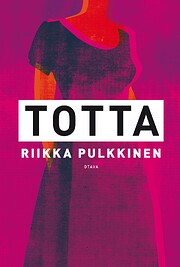

Click on a thumbnail to go to Google Books.
|
Loading... Totta (original 2010; edition 2010)by Riikka Pulkkinen
Work InformationTrue by Riikka Pulkkinen (2010)

No current Talk conversations about this book.   ) )True is a novel of 3 generations of an artistic and intellectual Finnish family -- Elsa, an eminent child psychologist, married to Martti, an artist; Eleeonora, her daughter, a surgeon; and Anna, who is caring for her grandmother, dying of cancer. True is a novel that explores an individual and her family coming to terms with the indignities and dignity of illness and impending mortality. True is Eeva's story -- the story of a liberated young woman in the 1960s, a university student with a nanny position, who falls in love with the father of the child she is caring for. True uncovers family secrets and probes the nature of memories and their impact on how relationships develop. True is a beautifully written, remarkable debut novel from Rikka Pulkkinen -- definitely a writer to keep an eye on. And it is wonderfully evocative of the Finnish landscape. [I received a review copy of this novel from Netgalley] Original review here: http://irisonbooks.com/2012/04/02/true-b... "Anna is quiet for a moment, then says, 'Every person’s sadness is their own. Other people can’t understand it.'" True centres around Elsa, who is dying from cancer. But in many ways, the story is not so much about her, as about her family members and the way they deal with their impeding loss. Key characters are Martti, Elsa’s husband; Eleonoora, the daughter of Elsa and Martti; and Anna, one of Eleonoora’s daughters. And somewhere in the memories of Elsa and Martti, and later on Eleonoora and Anna, is hidden another key character: Eeva, Eleonoora’s nanny and Martti’s mistress. Two key themes in this novel are love and loss. Rather big, and therefore easily perceived as empty, words, but they truthfully fit the book. Because of the double storyline of the loss of Elsa and the ones she loves as her family, and the pattern of love and loss in the affair between Martti and Eeva, these two themes are explored in a more worthwhile manner than the simple naming of them suggests. Add to that the layer of lost and found memories, and the truthfulness of those, and you may just begin to understand how this books delivers on some quite big themes through a micro study of an (extended) family. Pulkkinen’s style is beautiful and thoughtful, and she spends quite a lot of time featuring detailed contemplations on life through the eyes of several characters. Most of these are related to the grander themes mentioned before. These contemplative sentences all threaten to tip over the line of philosophical into corny, but most of the time they worked with the general point the book was trying to get across. I admit, True was a little confusing to me. I started reading this novel thinking it would be about a dying cancer patient and her family’s manner of coping. Instead, the novel heavily features the affair of Eeva and Martti, so much so that in the end I wonder if this is not rather the story of Eeva and Anna’s retelling of it, instead of a story revolving around Elsa. There is nothing wrong with that, although I do not in general do well with stories about affairs. I personally enjoyed True more than most stories about affairs that heavily feature "the other woman", because it plays less to feelings of victimization. I will say though, that I was left craving more details about Elsa’s illness and the contemporary dealing of the family. I felt a more natural sympathy for Elsa, and I was a little disappointed to see so little of Eleonoora and her other daughter, Maria. Overall, True is a satisfying, quiet, and contemplative read as long as you are prepared to go along with its switch in focus from Elsa’s story to that of Anna and Eeva. If it weren’t for the rather long middle section of the novel that I felt could have done with a little less detail, the book could have very well ended up ranking high on my almost favourites list of the year. As it is, it falls into the top layer of that middle section: nourishing, but not stunning enough to blow me away. no reviews | add a review
Awards
Elsa is dying. Her husband, Martti, and daughter Eleonoora are struggling to accept the crushing thought that they are soon to lose her. As Elsa becomes ever more fragile, Eleonoora's childhood memories are slipping away. Meanwhile, Eleonoora's daughter Anna spends her time pondering the fates of passersby. For her the world is full of stories. But the story that will change her forever is the one about Eeva, her mother's nanny, whom her grandparents have been silent about for years. Eeva's forgotten story, which Anna first learns of when she discovers an old dress of Eeva's, is finally revealed layer by layer. The tale that unfolds is about a mother and daughter, about how memory can deceive us--and sometimes that is the most merciful thing that can happen. No library descriptions found. |
Current DiscussionsNonePopular covers
 Google Books — Loading... Google Books — Loading...GenresMelvil Decimal System (DDC)894.54134Literature Other literatures Literatures of Altaic, Uralic, Hyperborean, Dravidian languages; literatures of miscellaneous languages of south Asia Fenno-Ugric languages Fennic languages Finnish Finnish fiction 2000–LC ClassificationRatingAverage: (3.61) (3.61)
Is this you?Become a LibraryThing Author. |
||||||||||||||||||||||||||||||||||||||||||||||||||||||||||||||||||||||||||||||||||||||||||||||||||||||||||||||||||||||||||||||||||||||